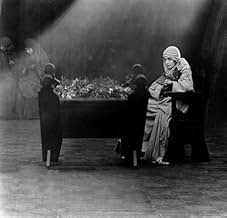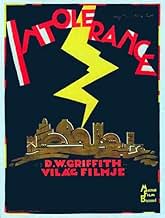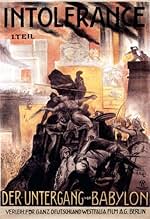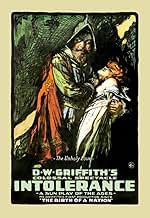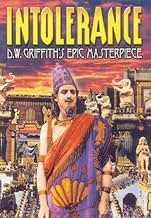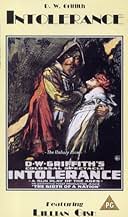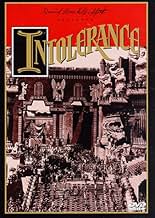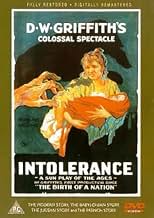CALIFICACIÓN DE IMDb
7.7/10
17 k
TU CALIFICACIÓN
La vida de una joven pobre, separada de su marido y su bebé por los prejuicios, se entremezcla con episodios de intolerancia a lo largo de la historia.La vida de una joven pobre, separada de su marido y su bebé por los prejuicios, se entremezcla con episodios de intolerancia a lo largo de la historia.La vida de una joven pobre, separada de su marido y su bebé por los prejuicios, se entremezcla con episodios de intolerancia a lo largo de la historia.
- Premios
- 2 premios ganados en total
F.A. Turner
- The Dear One's Father
- (as Fred Turner)
Julia Mackley
- Uplifter
- (as Mrs. Arthur Mackley)
John P. McCarthy
- Prison Guard
- (as J.P. McCarthy)
Argumento
¿Sabías que…?
- TriviaDuring filming of the battle sequences, many of the extras got so into their characters that they caused real injury to one another. At the end of one shooting day, a total of 60 injuries were treated at the production's hospital tent.
- ErroresOne of the early title cards in the Judean sequence refers to Jesus having been from "the carpenter shop in Bethlehem". Though he was born in Bethlehem, he worked with his father in a carpenter shop in Nazareth, which is why he was known as Jesus of Nazareth.
- Citas
Intertitle: When women cease to attract men, they often turn to reform as a second option.
- Créditos curiososConstance Talmadge is credited as 'Georgia Pearce' for her performance as Marguerite de Valois in the French Story. She is credited under her own name in the role of The Mountain Girl in the Babylonian Story.
- Versiones alternativasThe movie was officially restored in 1989 by Kevin Brownlow and David Gill for Thames Television. It was transferred from the best available 35mm materials, color-tinted per D.W. Griffith's intent, and contains a digitally recorded orchestral score by Carl Davis. This 176-minute version was released on video worldwide, but has never been telecast in the U.S.
- ConexionesEdited into The Fall of Babylon (1919)
Opinión destacada
Everything about this movie is fascinating, even its numerous flaws. It is as ambitious a movie as has ever been made, and if you adjust for the era, it might also be the most lavish, expensive, and painstaking. Even today the scope and detail stand out, despite the many technical limitations in its era. Likewise, the enormous cast list contains many names that silent film fans will recognize at once, with well-known performers even in some of the minor roles. Then, you could write many pages about the stories, which are filled with weaknesses, but which are also so interesting that you never want to miss what will happen next.
The concept behind "Intolerance" is as enterprising as it gets: no fewer than four complete, independent story-lines, with the movie switching back-and-forth among them, not necessarily in consecutive order but with a definite plan in mind, all in order to get across the idea suggested by the title - that is, that intolerance of others' beliefs or lifestyles has been a destructive force throughout history. It is generally understood that there is a strong dose of defensiveness behind this plan, since the ideas promoted in Griffith's previous film had earned for him some severe and well-justified criticism. This personal motivation could well explain why "Intolerance" is often so overblown, and it also is interesting in light of the stories chosen to illustrate the main themes.
The two most straightforward stories - the persecution of the Huguenots in 16th century France, and the persecution of Jesus Christ by the religious leaders of his day - are also the most believable, and yet they do not seem to get quite the screen time or the lavish detail of the other two. The contemporary story may have been the most important to Griffith, and it is a full-scale melodrama, full of heavy-handed developments and very unlikely coincidences, yet certainly a story that will hold your attention. The Babylonian story is at once the strangest choice, the most extravagant, and the most fascinating of all. As history, it is as distorted as (or more so than) any of today's movies. Trying to pass off Belshazzar of Babylon as a model of justice and tolerance is just weird, and the entire historical scenario is at best an imaginative embellishment of the truth. But the involved story that Griffith tells in this setting is so exciting and entertaining that you just can't take your eyes away from it.
Much, much more could be said, but anyone with an interest in silent movies or in cinema history will want to watch it and draw his or her own conclusions. Whether you want to analyze the vast array of themes, events, and ideas, or whether you just want to sit back and enjoy a fascinating spectacle, the three hours fly by very quickly, and it's a movie you won't forget.
The concept behind "Intolerance" is as enterprising as it gets: no fewer than four complete, independent story-lines, with the movie switching back-and-forth among them, not necessarily in consecutive order but with a definite plan in mind, all in order to get across the idea suggested by the title - that is, that intolerance of others' beliefs or lifestyles has been a destructive force throughout history. It is generally understood that there is a strong dose of defensiveness behind this plan, since the ideas promoted in Griffith's previous film had earned for him some severe and well-justified criticism. This personal motivation could well explain why "Intolerance" is often so overblown, and it also is interesting in light of the stories chosen to illustrate the main themes.
The two most straightforward stories - the persecution of the Huguenots in 16th century France, and the persecution of Jesus Christ by the religious leaders of his day - are also the most believable, and yet they do not seem to get quite the screen time or the lavish detail of the other two. The contemporary story may have been the most important to Griffith, and it is a full-scale melodrama, full of heavy-handed developments and very unlikely coincidences, yet certainly a story that will hold your attention. The Babylonian story is at once the strangest choice, the most extravagant, and the most fascinating of all. As history, it is as distorted as (or more so than) any of today's movies. Trying to pass off Belshazzar of Babylon as a model of justice and tolerance is just weird, and the entire historical scenario is at best an imaginative embellishment of the truth. But the involved story that Griffith tells in this setting is so exciting and entertaining that you just can't take your eyes away from it.
Much, much more could be said, but anyone with an interest in silent movies or in cinema history will want to watch it and draw his or her own conclusions. Whether you want to analyze the vast array of themes, events, and ideas, or whether you just want to sit back and enjoy a fascinating spectacle, the three hours fly by very quickly, and it's a movie you won't forget.
- Snow Leopard
- 6 nov 2002
- Enlace permanente
Selecciones populares
Inicia sesión para calificar y agrega a la lista de videos para obtener recomendaciones personalizadas
- How long is Intolerance?Con tecnología de Alexa
Detalles
Taquilla
- Presupuesto
- USD 385,907 (estimado)
- Tiempo de ejecución2 horas 43 minutos
- Mezcla de sonido
- Relación de aspecto
- 1.33 : 1
Contribuir a esta página
Sugiere una edición o agrega el contenido que falta

Principales brechas de datos
By what name was Intolerancia (1916) officially released in Canada in French?
Responda

